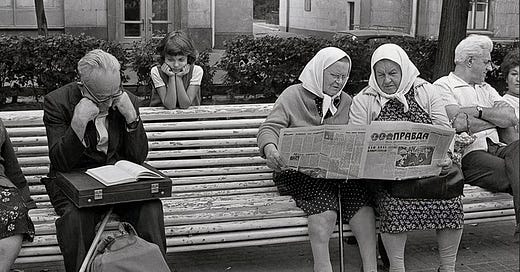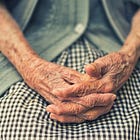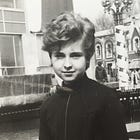Here is a personal story. I became a philosopher—spontaneously, as a kid— thanks to observing how the generation of my grandparents was thrown under the bus.
They were very strong people. Big-hearted people. Generous people. Straightforward people with the village moral values of honesty and resilience and putting the “collective” over the “personal,” for the sake of …. Wait a second, for the sake of what?
Here is the thing. They were completely enamored with “communism.” What was “communism” to them? It was the optimism and the inspired feeling of their youth, their first loves, their precious friendships, their professional goals, the hardships they had to overcome, the difficult war they won, the straightforward character of life, the innocence, the honesty, the respect, the simplicity of life. “Communism” to them was a theoretical foundation of the practical respect that their souls sought, like any human soul seeks respect.
“Communism” was a ghost, a fabrication, a multi-faceted historical lie—but not to them. To them, it was a sacred thing that breathed the spirit (a word they would never use) into their lives. “Communism” was an expression of their hearty relationships with other likeminded, poor people. It was respect for the soul, even though many probably didn’t even believe in the soul.
And then there was a regime change, and the ghost was taken away from them by the same state machine that had earlier seduced them with that very ghost. They were betrayed. The oligarch children of the old-time communist party leaders figured out a better way to steal—and so they threw the old people out to the landfill of history, together with the “Communist Manifesto,” the statues of Lenin, the values of their youth, etc. The entire theoretical foundation on the basis of which they had expected respect was nuked overnight.
And there they were, naked, older, betrayed, without many possessions—and yes, angry at being betrayed and convinced very passionately that the attack on the “communist values” and the sanctity of “Leninist ideals” had been carried out by the traitors of the Motherland. If you were to tell them that Lenin and his cronies were psychopathic blood-thirsty creeps, they would react aggressively, accuse you of being a traitor or a useful idiot, etc. Yes, they were very indignant about being betrayed and robbed of even the theoretical dignity. And sometimes, when nobody looked, they cried.
Being a witness to this act of cruelty, still a kid, I realized a few things:
Putting your heart’s trust in the “state” is unwise, the “state” betrays
It is practical to think long term
Ideas are transient—and love, respect, and family come first
People’s love for total BS can be strong and sincere
People and their adopted ghosts are separate entities, they are not the same
I can very well have good relationships with the people whose ideas I believe to be ridiculous, sad, or insane.
There is very little functional difference between the dogmatics of different flavors, even if they fight with each other and go at each other’s throats
It’s sincerity and benevolence that matter, not the talking points
People tend to fight hard for their right to have their ghost identity “respected,” and sometimes it’s near impossible for me to win that fight (at least not right away). I have to accept how life works on planet Earth
Usually, when someone gets super-triggered by my refusal to filter my own experiences through their Sacred Talking Points, it’s not really them lashing out at me, it’s their ghosts protesting and trying to avoid deportation from their soul
When human beings act bothered by my lack of cooperation with their Sacred Talking Points, it is my decision whether to hang around, come back later, or leave and forget about it, maybe with a prayer for them to walk their best destiny in the kindest way
All in all, the world is complex, and life is a very mysterious affair. I can only know my journey, not theirs. I don’t know what they are learning. Being brave but leaving the long-term arc to the higher powers is a soul-nourishing practical choice
As I sang and danced at the ruins of the USSR, I despised what the state had done to the elders. The elders held on to the Soviet ghost for their intellectual dignity—and I mourned their fate. I felt love. I was mad, mad, mad at the heartless kids who would mock some dejected, lone war veteran in the street who had stepped out in his finest jacket on a holiday, war medals and all, to walk around and feel honored—the way he’d been promised honoring by the Soviet state—but all of a sudden, under the new state, he got ridicule instead of respect. To this day, I want to cover that let down veteran with love. To this day, when I think about that robo-kid, I feel mad. How can you mock an elder who fought in a cruel war? What kind of a person does that? Anyway…
Pondering all that as a kid taught me to divorce ideas from love and try to interact with other people’s souls regardless of their—sometimes ridiculous and destructive, in my opinion—talking points.
(And you know what, it’s true that the “perestroika” reform was led a bunch of globalist-pleasing traitors—what a surprise!—but so was the Bolshevik coup. And a million other coups. Funny, I will never forget the beautiful feeling of “western freedom” that shaped me, it was sweet. But that, too, was a marketing trick. “Western freedom” that I greedily drank with my soul in Moscow was the sound of multinationals moving in. It was the sound of another coup.
My God, that was so sweet though. So fake. Such a lie. But so sweet.
The experience of the Soviet elders taught me love. It taught me to love the good-hearted, broken sometimes, imperfect people with ridiculous ideas, as long as they are good to me. And I intend to stay this way. It helped me get through the past four years.
A note to readers: If you are in the position to do so, I very much encourage you to become a paid subscriber or donate. I love you in any case, but it helps A LOT, and I am in a dire need to get more donations and paid subscribers while keeping my posts free. Thank you from my heart for your support!









My Grandmother was the same kind of person as your Grandparents though she was a hillbilly living in the Ozark Mountains of Arkansas. She loved her neighbors regardless of what kind of person they were. She cried at people's funerals she barely knew. She was simple and wise and churned her own butter and taught me the kindest ways to slaughter animals, among many things.
She said one of the most profound things to me before she died. She said the worst thing about getting old was she was still an eighteen year old girl inside.
I saw her in a completely new light after she said that and understood what she meant about "the worst thing" since everyone treated her like she was an old woman. She was never an old woman.
Thank you for the beautiful story.
One of your most poignant and touching essays, Tessa, thank you so very very much!